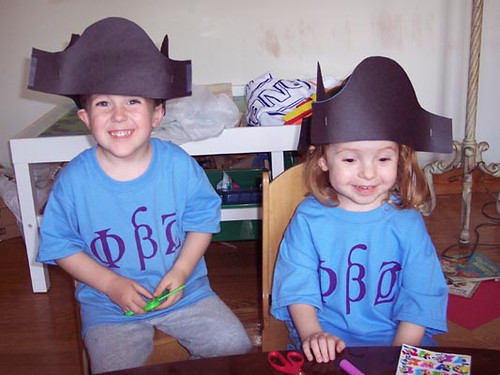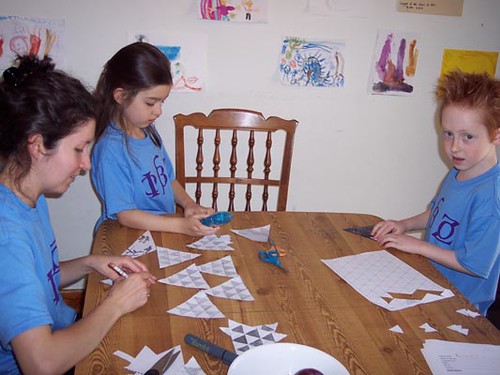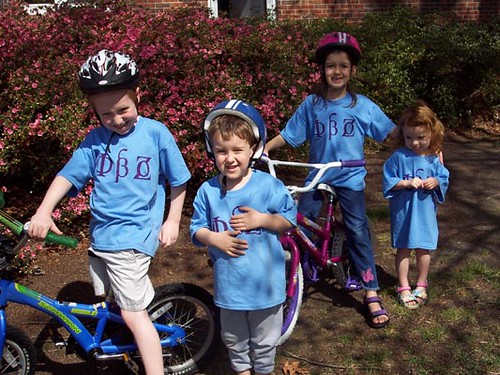My friend Veronica and I each have two kids. Between us we have two seven-year-olds, a three-year-old and a four-year-old. They have been playing together for three years now. Their little conflicts have been worked through, their little power struggles have been settled, and now they play happily, kind of like cousins. Yes, problems arise, but they all know each other very well and they're getting adept at avoiding trouble.
Both of our families have been in search of a co-op to supplement our homeschooling efforts, but haven't found one just right. The closest thing we hit on was the Renaissance school, but that's a looooong way from here, and there are the little ones to consider. We decided to try making our own, tiny, insular co-op, once a week. We started almonst two months ago. She takes the older ones while I take the younger ones, then we have lunch, play, and switch.
We call it, with tongues firmly in cheek, the Phi Bensa Zoe Academy, making pseudo-Greek letters from the kids' names. The pictures you see here are of our first meeting, where we were just figuring things out and we took it very easy. Our second meeting, Veronica began teaching Latin to the older kids (using Minimus) and I am teaching them microbiology -- cells, bacteria, microscopes, etc. I'm teaching the little ones phonics and writing, and Veronica is teaching them science and social studies in mini-units.
I have to say, and I have cautiously waited to blog about it until now, because you never know how kids are going to adjust to these arrangements, that it is working out GREAT. The kids love it, and it gives us a chance to do games and activities that make learning fun, but that you just can't do with only one child. It also helps with the age difference, so that the younger ones aren't always upsetting delicate science experiments, and the older ones aren't always giving the answers before the little ones can work it out for themselves.


How can it possibly work out, having a co-op so small? Well, there are down sides. We can't put on a school play. We have only ourselves to rely on for expertise -- so we have microscopes being operated by an English major, and so on. But we can sing together, play our violins and piano together, do book reports and demos. We're flexible -- if someone is sick, we can move the day, or if someone has an appointment, change the time a few hours forward or back. We can follow our whims -- if we feel like a bike ride first or we really need to eat a snack, we can accommodate that without putting anyone out.
While the children do get a tiny bit of competition, to put a gentle urgency to their answering of questions and completing of assignments, they also can receive the pacing and attention geared to their specific needs.
I have been often confused by people who put their kids into a very school-like environment, after taking them out of school. I understand everyone has different needs and differnet reasons for homeschooling, but for me -- one of the reasons I took him out of school was to avoid the classroom. Our little "academy," for now, is giving us exactly what we need. Structure, accountability, and competition, but it still feels very much like homeschool. I'm grateful to Veronica for being such a kindred spirit!
Watching them jump in the trampoline yesterday, all together, co-operating on how to take turns and protect the littlest one from getting jumped onto her head, I was very happy. It's a good thing, for these children, at this time. I highly recommend it. If you can find one other family, with a similar teaching philosophy and children close in age, try it! See if it works for you.


No comments:
Post a Comment